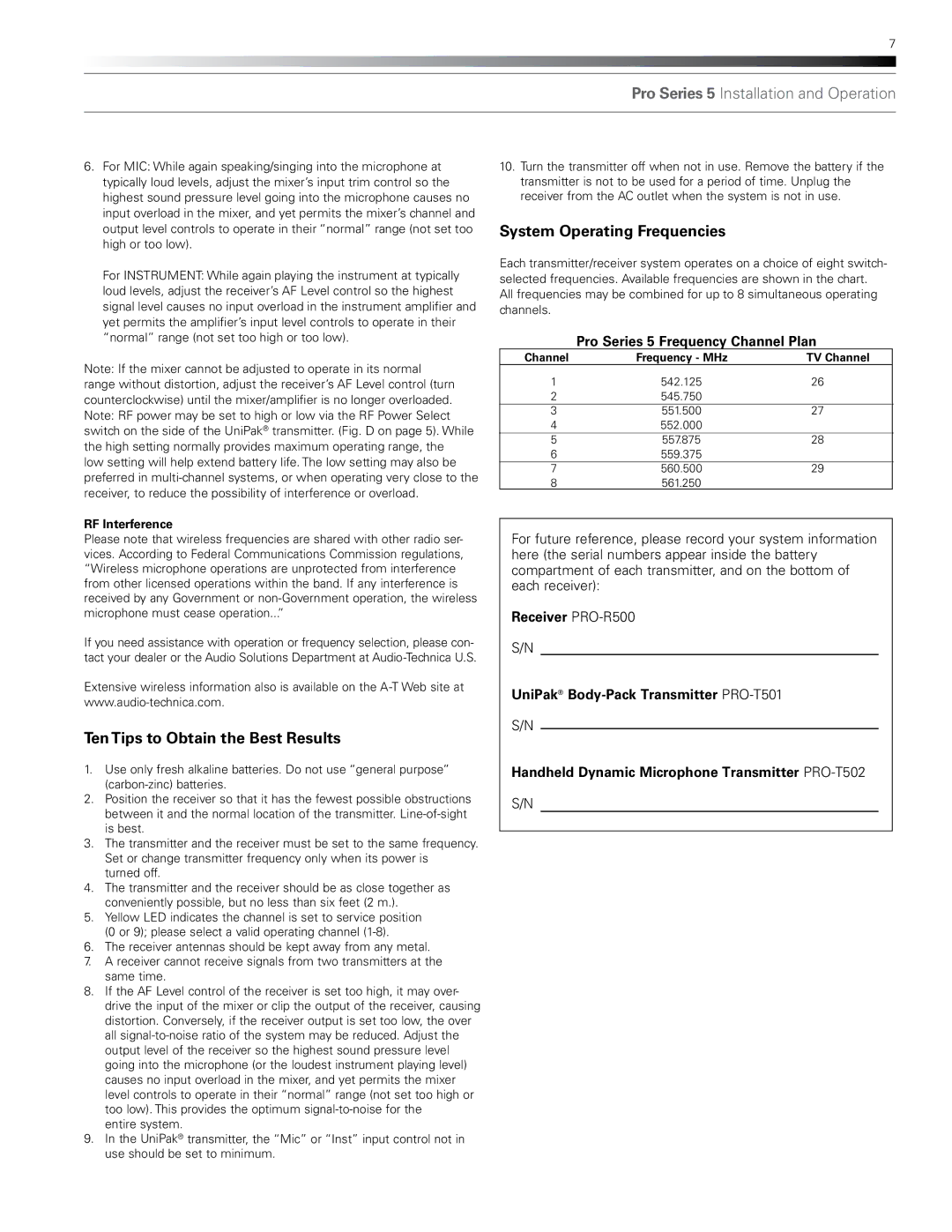
7
Pro Series 5 Installation and Operation
6.For MIC: While again speaking/singing into the microphone at typically loud levels, adjust the mixer’s input trim control so the highest sound pressure level going into the microphone causes no input overload in the mixer, and yet permits the mixer’s channel and output level controls to operate in their “normal” range (not set too high or too low).
For INSTRUMENT: While again playing the instrument at typically loud levels, adjust the receiver’s AF Level control so the highest signal level causes no input overload in the instrument amplifier and yet permits the amplifier’s input level controls to operate in their “normal” range (not set too high or too low).
Note: If the mixer cannot be adjusted to operate in its normal range without distortion, adjust the receiver’s AF Level control (turn counterclockwise) until the mixer/amplifier is no longer overloaded. Note: RF power may be set to high or low via the RF Power Select switch on the side of the UniPak® transmitter. (Fig. D on page 5). While the high setting normally provides maximum operating range, the low setting will help extend battery life. The low setting may also be preferred in
RF Interference
Please note that wireless frequencies are shared with other radio ser- vices. According to Federal Communications Commission regulations, “Wireless microphone operations are unprotected from interference from other licensed operations within the band. If any interference is received by any Government or
If you need assistance with operation or frequency selection, please con- tact your dealer or the Audio Solutions Department at
Extensive wireless information also is available on the
Ten Tips to Obtain the Best Results
1.Use only fresh alkaline batteries. Do not use “general purpose”
2.Position the receiver so that it has the fewest possible obstructions between it and the normal location of the transmitter.
3.The transmitter and the receiver must be set to the same frequency. Set or change transmitter frequency only when its power is turned off.
4.The transmitter and the receiver should be as close together as conveniently possible, but no less than six feet (2 m.).
5.Yellow LED indicates the channel is set to service position (0 or 9); please select a valid operating channel
6.The receiver antennas should be kept away from any metal.
7.A receiver cannot receive signals from two transmitters at the same time.
8.If the AF Level control of the receiver is set too high, it may over- drive the input of the mixer or clip the output of the receiver, causing distortion. Conversely, if the receiver output is set too low, the over all
entire system.
9.In the UniPak® transmitter, the “Mic” or “Inst” input control not in use should be set to minimum.
10.Turn the transmitter off when not in use. Remove the battery if the transmitter is not to be used for a period of time. Unplug the receiver from the AC outlet when the system is not in use.
System Operating Frequencies
Each transmitter/receiver system operates on a choice of eight switch- selected frequencies. Available frequencies are shown in the chart. All frequencies may be combined for up to 8 simultaneous operating channels.
Pro Series 5 Frequency Channel Plan
Channel | Frequency - MHz | TV Channel |
1 | 542.125 | 26 |
2 | 545.750 |
|
3 | 551.500 | 27 |
4 | 552.000 |
|
5 | 557.875 | 28 |
6 | 559.375 |
|
7 | 560.500 | 29 |
8 | 561.250 |
|
For future reference, please record your system information here (the serial numbers appear inside the battery compartment of each transmitter, and on the bottom of each receiver):
Receiver
S/N
UniPak®
S/N
Handheld Dynamic Microphone Transmitter
S/N
